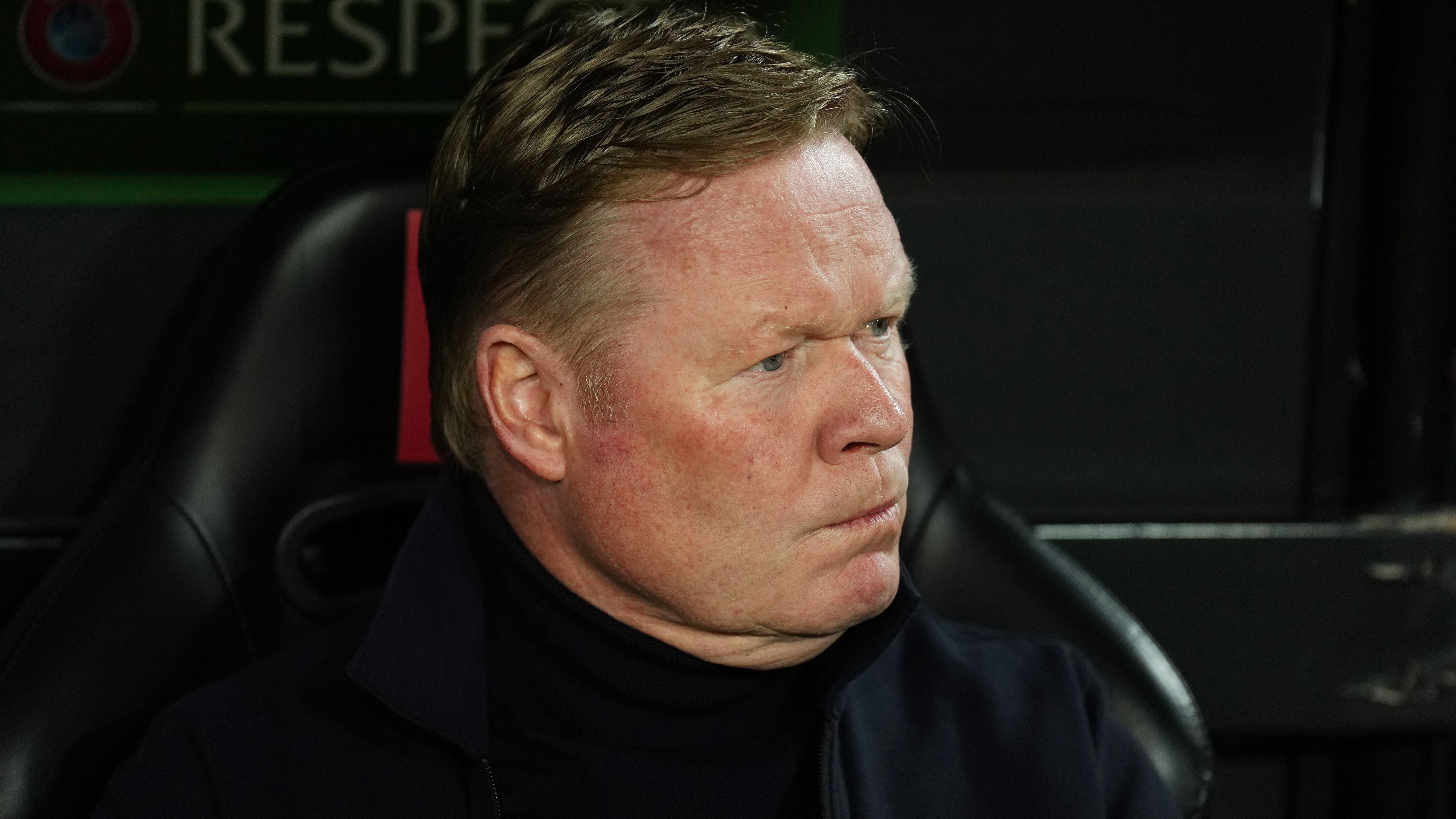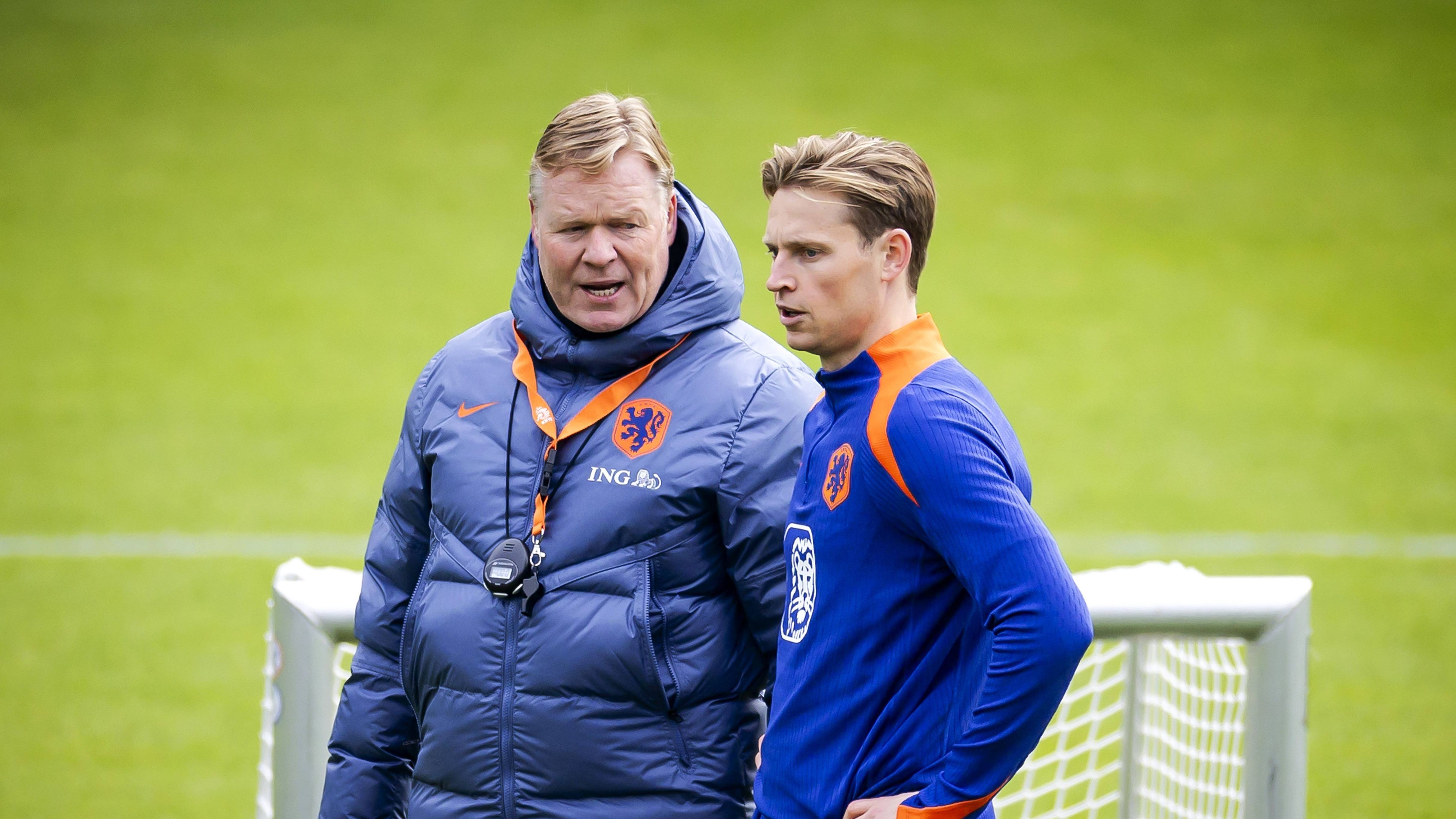Discover Why Ronald Koeman Prefers the National Stage Over Club Chaos
In a revealing discussion on Dutch television, Ronald Koeman, the experienced coach, shared his thoughts on stepping away from club management, highlighting how his current role has reshaped his career priorities. While he hasn’t completely dismissed the idea, the prospects of returning to a club position appear minimal, driven by a newfound appreciation for international duties.
- Ronald Koeman indicates that resuming club coaching is highly unlikely
- The 62-year-old coach finds greater satisfaction in leading national teams
- Former Barcelona manager reflects on how club challenges affected his experience



Ronald Koeman’s Extensive Coaching Journey
Throughout his career, Koeman has helmed several elite teams, such as Ajax, Benfica, PSV, Valencia, Southampton, Everton, and Barcelona. His most recent club role ended at Barcelona, where he secured the Copa del Rey in 2021, only to be let go later that year amid a difficult beginning to the La Liga campaign. Having previously overseen the Netherlands from 2018 to 2020, he stepped back in after the 2022 World Cup due to Louis van Gaal’s health issues, marking a significant pivot in his professional path.
The Allure of National Team Dynamics
On the Dutch program De Avondetappe, Koeman suggested that his era of club leadership might be concluding. He stated, “It’s not set in stone, yet the likelihood of me taking on a club role again is quite low.” This statement underscores his growing preference for national setups, where he values the positive atmosphere surrounding the Dutch squad more than the intensity of club environments.
Key Reasons for Koeman’s Shift in Focus
Koeman elaborated that the national team setting brings a sense of joy and unity, noting, “The players arrive with enthusiasm, eager to reunite and communicate in their native language.” He also pointed out that avoiding the emotional turbulence of handling upset athletes allows him to concentrate solely on strategic elements of the game, rather than getting sidetracked by interpersonal conflicts.
Looking Ahead to Global Competitions
Moving forward, Koeman’s attention is fixed on readying the Netherlands for the 2026 World Cup, hosted across Canada, the USA, and Mexico. Following their disappointing defeat to Argentina in the contentious 2022 quarterfinals, the squad aims for a stronger performance. For Koeman, the international arena has become his sole focus, representing a more fulfilling chapter in his coaching story.
Ronald Koeman’s Career Highlights and Decisions
Background on Ronald Koeman’s Managerial Journey
Ronald Koeman, the former Barcelona manager, has had a storied career both as a player and a coach, making him one of the most respected figures in European football. With a background that includes playing for clubs like Barcelona and the Netherlands national team, Koeman transitioned into management with a focus on tactical discipline and youth development. His experiences in top-tier leagues have influenced his decisions on future roles in club coaching versus national team commitments.
Key milestones in Koeman’s career include his successful stints at clubs like Ajax, Valencia, and Everton, where he implemented attacking strategies that aligned with modern football trends. For anyone following Ronald Koeman’s updates, it’s clear that his approach to the game has always emphasized player welfare and long-term growth, which played a significant role in his time at Barcelona.
Koeman’s Tenure at Barcelona
During his time as Barcelona manager, Ronald Koeman faced immense pressure in a high-stakes environment characterized by intense media scrutiny and high expectations. Appointed in 2020, he aimed to rebuild the team after a turbulent period, focusing on integrating young talents like Ansu Fati and Pedri into the squad.
- Major Achievements: Under Koeman, Barcelona secured a spot in the Champions League and won the Copa del Rey, demonstrating his ability to balance defensive solidity with creative play.
- Challenges Encountered: The team struggled with inconsistent results in La Liga, partly due to financial constraints and injuries to key players. This period highlighted the demanding nature of club coaching, where Ronald Koeman had to manage daily training, transfer negotiations, and fan expectations.
- Departure Details: Koeman was dismissed in 2021 amid poor form, which he later reflected on as a pivotal moment that shaped his views on the toll of club-level management.
This phase of Ronald Koeman’s career underscored the high demands of club coaching, often requiring him to juggle multiple responsibilities that impact personal life and professional focus.
Transition to the Netherlands National Team Role
After leaving Barcelona, Ronald Koeman took on the role of manager for the Netherlands national team in 2023, a position that allowed him to leverage his experience as a former player for the Oranje. This move marked a significant shift from the day-to-day grind of club football to the more periodic nature of international management.
In this capacity, Koeman has emphasized building a cohesive team for major tournaments like the UEFA European Championship and the FIFA World Cup, using his deep understanding of Dutch football philosophy. The impact of his Netherlands role on Ronald Koeman’s decisions about club coaching cannot be overstated, as it offers a more balanced schedule and less administrative burden.
- Key Benefits of the Role: Working with the national team provides Ronald Koeman with opportunities to focus on strategy without the constant pressure of domestic leagues, allowing for better player development and tactical innovation.
- Comparisons to Club Coaching: Unlike club management, where coaches handle weekly matches and youth academies, the Netherlands job involves concentrated camps and qualifiers, giving Koeman more time for family and personal interests.
- Recent Statements: In recent interviews, Ronald Koeman has indicated that the stability and fulfillment from his Netherlands role have influenced his reluctance to return to club coaching, citing the exhausting travel and media demands as deterrents.
Reasons Behind Koeman’s Decision Not to Return to Club Coaching
Ronald Koeman’s choice to step away from club-level roles stems largely from the profound effects of his current Netherlands position. He has publicly discussed how the national team setup has restored his passion for coaching while minimizing burnout, a common issue among managers in club football.
Impact on Work-Life Balance
One of the most significant factors in Ronald Koeman’s decision is the improved work-life balance that comes with managing a national team. Club coaching often involves relentless schedules, including midweek games and transfer windows, which can lead to fatigue.
- Personal Insights: Koeman has shared that his Netherlands role allows for extended breaks between international windows, enabling him to recharge and spend time with family, something he missed during his Barcelona days.
- Health and Longevity: At his age, Ronald Koeman prioritizes mental health, noting that the less intense pace of international football helps sustain a longer career without the risks associated with club management stress.
Commitments and Tactical Focus in National Team Football
The strategic demands of Ronald Koeman’s Netherlands role have also played a crucial part in his decision-making. National team coaching allows for a purer focus on tactics and team unity, free from the distractions of club politics.
- Advantages Over Club Roles: In the Netherlands setup, Koeman can concentrate on high-level competitions without dealing with squad rotations or boardroom interference, which he found overwhelming at Barcelona.
- Future Implications: This role has positioned Ronald Koeman as a mentor for emerging talents, potentially influencing the next generation of Dutch players and solidifying his legacy in international football.
The Evolving Landscape of Football Coaching for Koeman
In the broader context of football management, Ronald Koeman’s experiences highlight emerging trends where coaches are opting for national roles for greater autonomy. His insights into the impacts of different coaching environments provide valuable lessons for aspiring managers and fans alike.
Potential Paths Ahead
Looking at Ronald Koeman’s future, his commitment to the Netherlands could extend beyond immediate terms, with possibilities for involvement in advisory roles or even global ambassadorships. This evolution reflects a shift in how former Barcelona managers and similar figures navigate their careers post-club stints.
- Opportunities and Challenges: Ronald Koeman might explore roles that combine his expertise in player development with less demanding commitments, such as coaching seminars or youth programs.
- Broader Industry Trends: The decision underscores a growing preference among coaches for roles that offer strategic depth without the exhaustive schedules of club football, a trend seen in managers like him who value long-term impact.
By examining Ronald Koeman’s journey, readers can gain a deeper understanding of the personal and professional factors that shape a coach’s career decisions in today’s dynamic football world.









